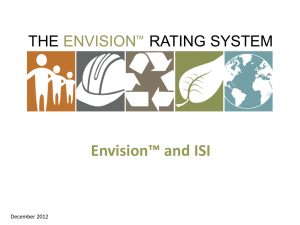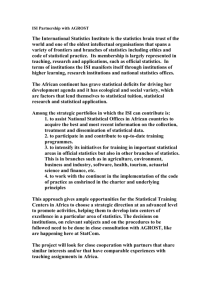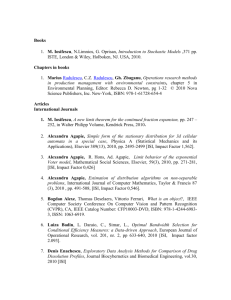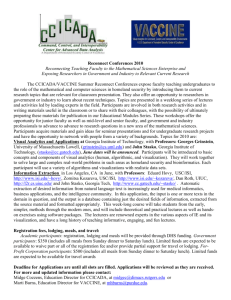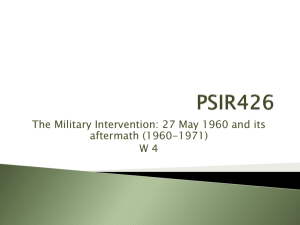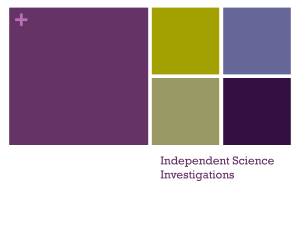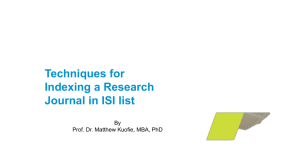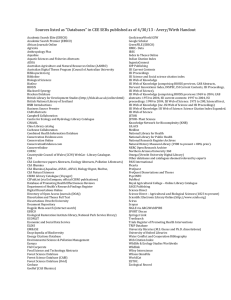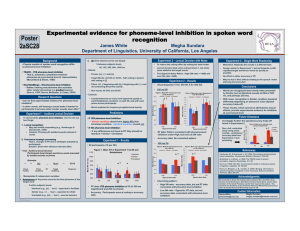ISI Overview JG 2011..
advertisement
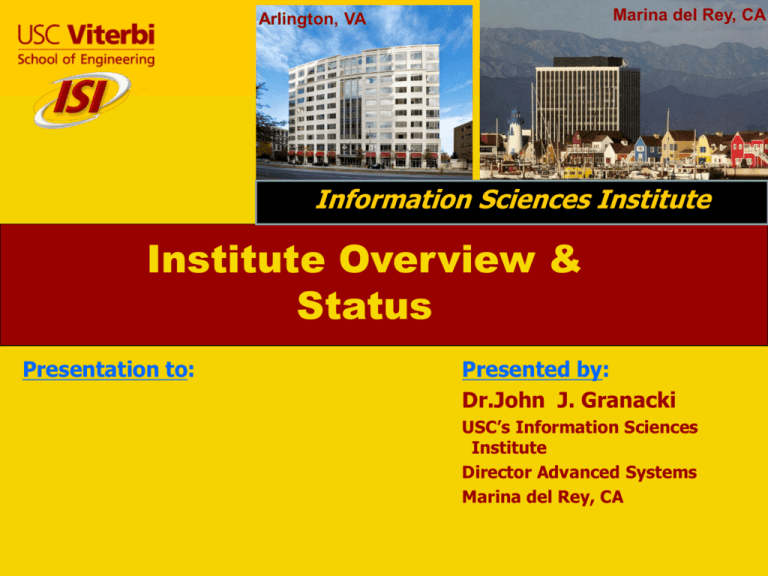
Marina del Rey, CA Arlington, VA Information Sciences Institute Information Sciences Institute “We are the ‘&’ in R&D Institute Overview & Status Presentation to: Presented by: Dr.John J. Granacki USC’s Information Sciences Institute Director Advanced Systems Marina del Rey, CA 1 ISI Summary Organization: large, vibrant, research-sponsored Institute: • • • • Mission: traditional basic and applied research combined with education and building real systems: • • Part of USC’s Viterbi School of Engineering located in “Marina Tech Campus” (Marina del Rey). >$75M per year in funding from a diversified base of sponsors. RESEARCH >330 people mostly research staff. Facilities to conduct ITAR, classified and unclassified research. PROFESSIONAL Projects - small, medium, and large. EDUCATE Staff - mix of faculty, students, and full-time research personnel. BUILD & USE Technology: broad research profile across computer sciences, mathematics, engineering, and applied physics. Sponsors: DoD research agencies, intelligence community, NIH, DOE technical offices, and industrial/commercial entities. > 35-year track record of performing world-class research while deploying prototypes that address important customer problems Version-Final, 01/25/2011 2 Core Competencies Intelligent Systems Natural language Education, training and cognitive development Knowledge representation/acquisition, and data mining Robotics and virtual humans Informatics, Networking, and Computing Systems Networking principles, architectures and protocols Information technologies, security strategies, and infrastructure Cloud & Grid computing, distr. workflows, and decision-support systems Health-informatics, medical records, and energy-informatics Advanced Electronic Systems Scalable and low-power embedded systems VLSI and System-on-a-Chip (SoC) technology & MOSIS Trusted/reliable electronics/systems Bio-mimetic, medical electronics, and bio-inspired systems Space applications (electronics & small platforms) Version-Final, 01/25/2011 3 ISI’s Current Organizational Structure Version-Final, 01/25/2011 4 ISI’s Mode of Operation Nation-wide collaborations strengthening its technical skills Version-Final, 1/25/2011 5 Brief History & Diversification ISI was formed almost as a captive organization to DARPA. For many years, DARPA was almost the sole supporter of ISI: • MOSIS • Internet • Natural language and A.I. Over last decade, ISI sought new sources of research sponsorship, technologies, and new research disciplines: • Developed ties to IC community, DOE, NSF, NIH, etc. • MOSIS became self-sufficient, Developed internal capability to foster and advocate innovative, visionary solutions. ISI has come-out of this process more diversified, more aware of broad areas of research, suited to end-to-end program goals and deliverables, and developed a vibrant technology-agile staff Version-Final, 1/25/2011 6 Funding Distribution by Source DARPA DARPA NIH NIH REMARKS -- UFY -10 total funding $77M; UFY-2011 total funding >$82M (Estimated) -- UFY-2010 Distribution: DARPA 29%, NIH 13%, NRO 9%, NSF 19%, Other 33% -- Technology portfolio is balanced among the various funding sources -- Dramatic shift from the 90’s and early 2000’s where DARPA was >75% -Version-Final, 1/25/2011 7 Sample of Major DARPAawarded Recent Programs ISI in last 4 years (2007 – 2010) awarded over $60M from DARPA mostly in the areas of micro-electronics, networking, and artificial intelligence Trusted Electronics MTO – Developing methods to ensure operational trust of DoD electronics MONARCH IPTO - Developed an ASIC in 90nm technology of more than 280M cells for DoD applications Statistical Machine Translation IPTO - Developing automatic translation of human languages Brain-implementable Bio-mimetic Electronic DSO - Developed chips to by-pass damaged brain regions and restore cognition Training Superiority: Tactical Iraqi IPTO - Developed training tools to speed-up language and culture learning Version-Final, 1/25/2011 8 Sample of Non DARPAawarded Recent Programs ISI in last 4 years (2007 – 2010) awarded over $140M from other sources (CY2009: $43M) mostly in areas of informatics, health, energy, and intelligence. Fusing Geospatial Data with Online Sources to Analyze and Label Imagery OGA – Mapping overhead imagery to on-line sources to determine location. Defense Technology Experimental Research Laboratory Testbed (DETER) DHS – Distributed across U.S. testbed to emulate and study cyber attacks. Energy-Informatics DOE – Systems for demand-response and security for smart grid. Computational Infrastructure for Biomedical Research NIH – Collect health data and provide taxonomies to aid bio-medical research. Health-informatics INDUSTRY - Understanding health data to aid physicians to make better decisions. ISI’s staff is constantly engaged with government’s DoD and Civil S&T organizations helping to evaluate promising ideas. Version-Final, 1/25/2011 9 ISI’s New Initiatives ISI is investing in new initiatives that potentially have a strong impact on DoD and the nation at large. Their solutions require technology development, or maturation of emerging technology. Typical and critically important initiatives include: • MOSIS - Plus • Medical Electronics • Manufacturing Informatics • Wireless Networks & Security • Alternative Sources for Energy Harvesting beyond Wind and Solar • K-12 STEM Education These ISI initiatives are ideas generated from its own staff– sponsored by ISI’s internal investment. Version-Final, 1/25/2011 10
